Grapefruit Auto Cannabis Strain Week-by-Week Guide
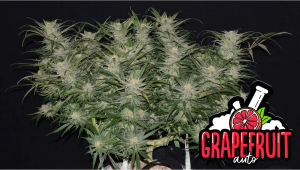
- 1. Grow specifications
- 2. Grow set up
- 3. Germination and seedling stage | week 1
- 4. Early veg | week 2
- 5. Mid veg | weeks 3-5
- 6. Transition (pre-flower) | week 6
- 7. Early flower | weeks 7-8
- 8. Mid flower (bulk phase) | weeks 9-10
- 9. Ripening and harvest | week 11
- 10. Yield and smoke report
- 11. In conclusion
People love a citrus flavor in their weed, and Grapefruit Auto is one of those strains where this desirable flavor is the most pronounced. This is also a very sought-after autoflower thanks to its compact size yet huge and dense buds, and you don't even have to be a pro to get record-setting yields with this perfectly low-maintenance and easy-to-grow plant.
In our Grapefruit Auto week-by-week guide, we'll show you how easy it is to cultivate this weed indoors by following a grow diary by a very experienced gardener who experimented with topping his plant and pushing her to the limit with nutrients. She took all this in stride, and rest assured that this strain will demonstrate the same hardiness outdoors as well.
1. Grow Specifications
Growers who love balanced hybrids will appreciate Grapefruit's genetic makeup that comprises 50% Indica and 50% Sativa. The Sativa part is usually used in crosses for the quality of the smoke it provides while the Indica part helps achieve such desirable characteristics as compact structure, short internodes, and fast flowering time. Grapefruit Auto seldom grows taller than 80-120 cm (31-47 inches) and takes about 9-10 weeks to mature. Nevertheless, this cultivar is incredibly generous and can bring as much as 400-550 gr/m2 (1.3-1.8 oz/ft2) indoors while the outdoor yields are usually between 50-250 g (2-9 oz) per plant.
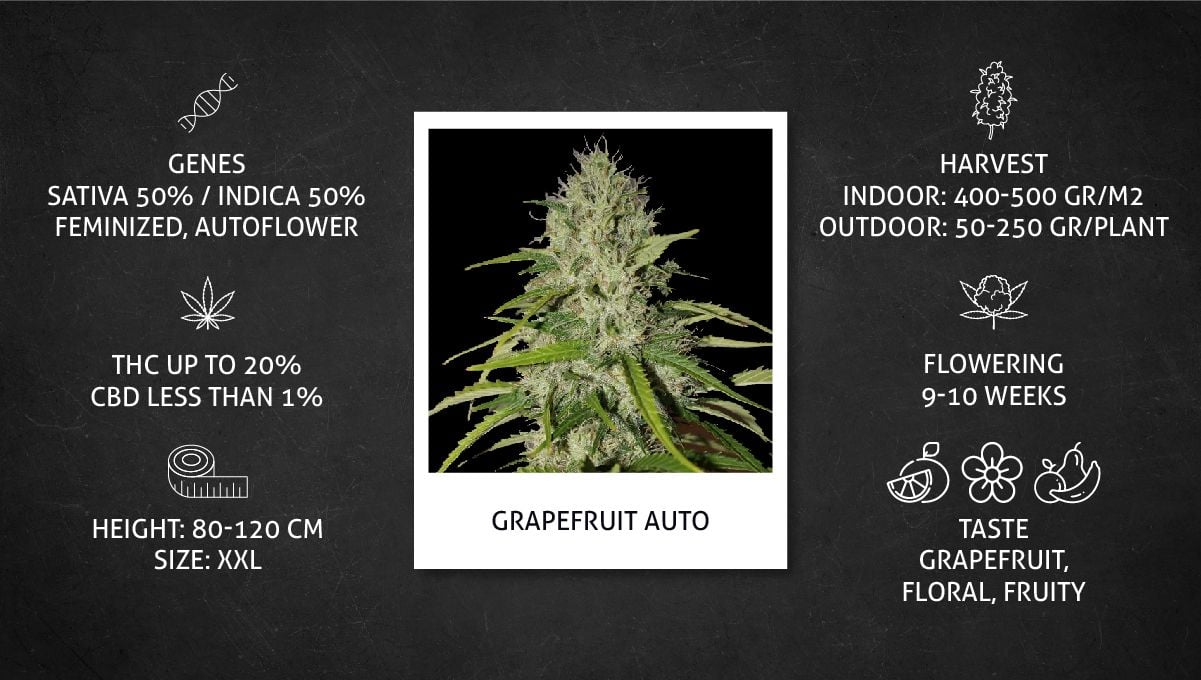
Of course, the quality of the smoke is another reason this autoflower is so popular. The THC level can reach 20% while the CBD production is much more modest at under 1%. With a name like this, you can count on Grapefruit being very tasty weed with floral and fruity notes dominated by citrus.
2. Grow Set Up
A highly experienced grower with the nickname Hawkbo grew one Grapefruit Auto and three other autoflowers in a 3’7”x3.7” grow tent under LED lights that were collectively drawing 400 watts from the socket. He ran them in a 22/2 light cycle – a bit unusual, but modern autoflowers can handle even 24/0 and still begin and finish flowering in time. Usually, he waters his auto manually, but this time he experimented with Aquapots that use a wick principle – when the nutrient solution comes up into the root zone from the trays below the pots.
| Grow Space: | 1.22 m2 | Pot Size: | 15 l |
|---|---|---|---|
| Seed to Harvest: | 11 weeks | Medium: | 75/25 Soil/Perlite |
| Flowering: | 6 weeks | Nutrients: | Organic/Synthetic |
| Light Cycle: | 22/2 | pH: | 5.8 |
| Light Type: | LED | Day Temperature: | 26°C |
| Watts Used: | 400W | Humidity: | 55-99% |
3. Germination And Seedling Stage | Week 1
Even beginners realize that they need to give their seeds and young seedlings the best in the first days of their life cycle. However, they often try to achieve this goal by getting fancy, i.e. using hydrogen peroxide, scuffing the seeds, and adding different root stimulants to the water, etc. All this may help when done expertly, but the more complicated you make things the more room for mistakes you get. We recommend focusing on the essentials for the first grow or two and using the most basic germination methods.
The two most important things for marijuana seeds germination are warmth and humidity. Without either of them, the seed won't sprout. The third thing (also important) is darkness. Ensure these three, and everything will be alright. Please also keep in mind that once the seeds have sprouted, they'll continue to benefit from warm and humid conditions, but now they'll also need light.
| Plant Height: | 3 cm | Humidity: | 99% |
|---|---|---|---|
| Distance to Light: | 61 cm | Water per Day: | – |
| Day Temp: | 26°C | pH: | 5.6 |
| Night Temp: | 20°C | TDS: | 200 ppm |
As the most sure-fire method of cannabis germination, we recommend keeping the seeds between wet paper towels and checking from time to time if they popped or not. In most cases, 48 hours are enough for fresh viable seeds to crack and show taproot. We also advise waiting before the taproot is about half an inch long and only then planting it into the medium – this increases the seed's chances and future vigor of growth.
It's debatable whether it's better to first plant the autoflower in a solo cup and then transplant it into the final pot or use the final pot from day one. The former method makes watering easier (watering a tiny seedling in a huge pot is a much harder problem), but the latter allows you to avoid the stress of repotting. We advise growing autos in final pots from seed to harvest, especially if you're a first-time weed grower.
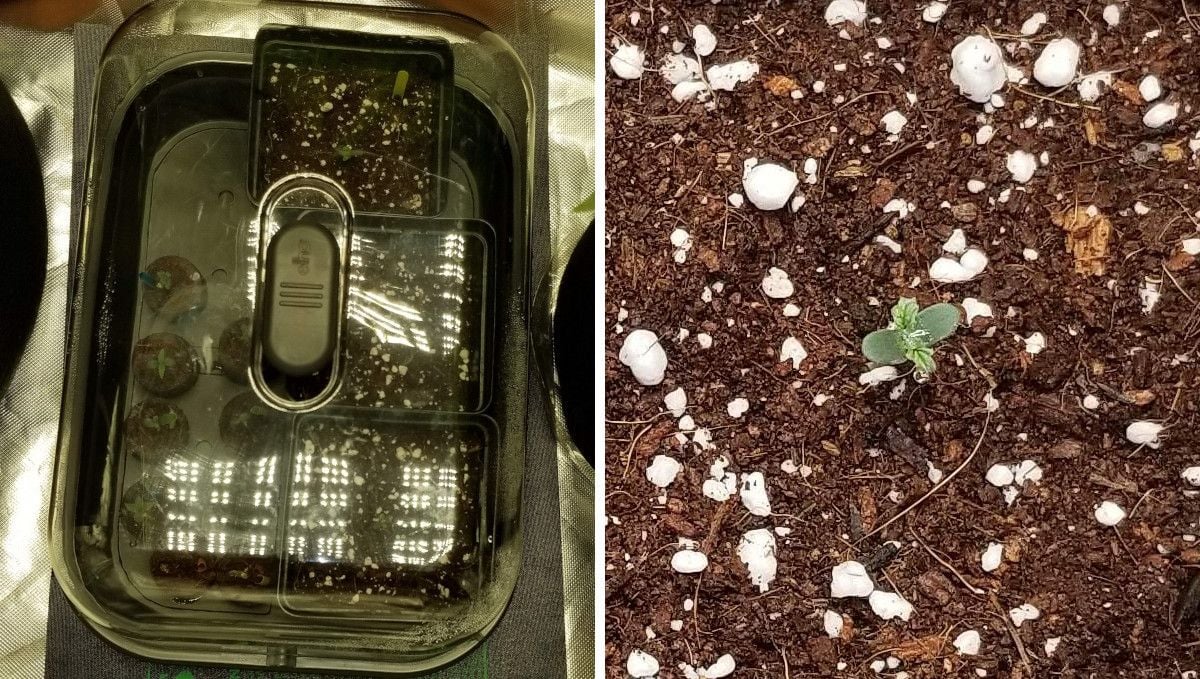
This Grapefruit Auto was spouted in jiffy pugs and kept under a humidity dome to achieve 99% RH. Then, the seedling was planted into a 3.9-gallon (14.76-liter) Aquapot filled with a 75/25 soil/perlite mix. Mixing in 15% of perlite or more helps you aerate the medium, meaning that every grain of perlite serves as an air pocket, so that roots situated next to it can breathe oxygen even if the container has just been watered. This gives a huge boost to the health of your marijuana plants as they love oxygen.
Experienced gardeners make sure that their marijuana plants experience no deficiencies from the start, and one of the ways to achieve this is to pre-treat the medium with some kind of a Cal-Mag product. (Calcium and magnesium are very easily depleted, especially in coco mediums but in soil too.) In this grow, the gardener did that with Botanicare Cal-Mag Plus and would go on using it for the rest of the grow. Also, for the first two weeks, his Grapefruit Auto sprout also received CANNA Start with its light mix of all essential nutrients that a seedling requires.
We'd argue that it isn't really necessary to feed your seedling anything at this stage (because there's still enough plant food in the soil), but this grower set out to experiment with high doses of nutrients from seed to harvest (spoiler alert: it turned out quite successful).
4. Early Veg | Week 2
The most important thing that a seedling requires is warm temperatures – 77-78 °F (25-26 °C). At this vulnerable stage, it's best not to go too far outside this optimal range as otherwise growth may be stunted. Almost equally important is the correct RH which should be as high as 75% now. If the air in your grow room is much drier than that, use a humidity dome. For small plants like this, a glass or a jar will do the trick.
| Plant Height: | 8 cm | Humidity: | 65% |
|---|---|---|---|
| Distance to Light: | 61 cm | Water per Day: | – |
| Day Temp: | 26°C | pH: | 5.8 |
| Night Temp: | 20°C | TDS: | 550 ppm |
For his Grapefruit Auto and other strains in the grow tent, the grower stopped using humidity domes as the RH was high enough anyway at 65%. He also made sure to keep the correct distance between the light and the plants. Contrary to what newbies think, you CAN overwhelm a young plant with excessive light and stunt it. Your goal is to keep your LED at such a distance so that the plant doesn't stretch excessively but also doesn't stay too close to the ground. In the pic below, you can see that all the plants are just perfect in this respect.
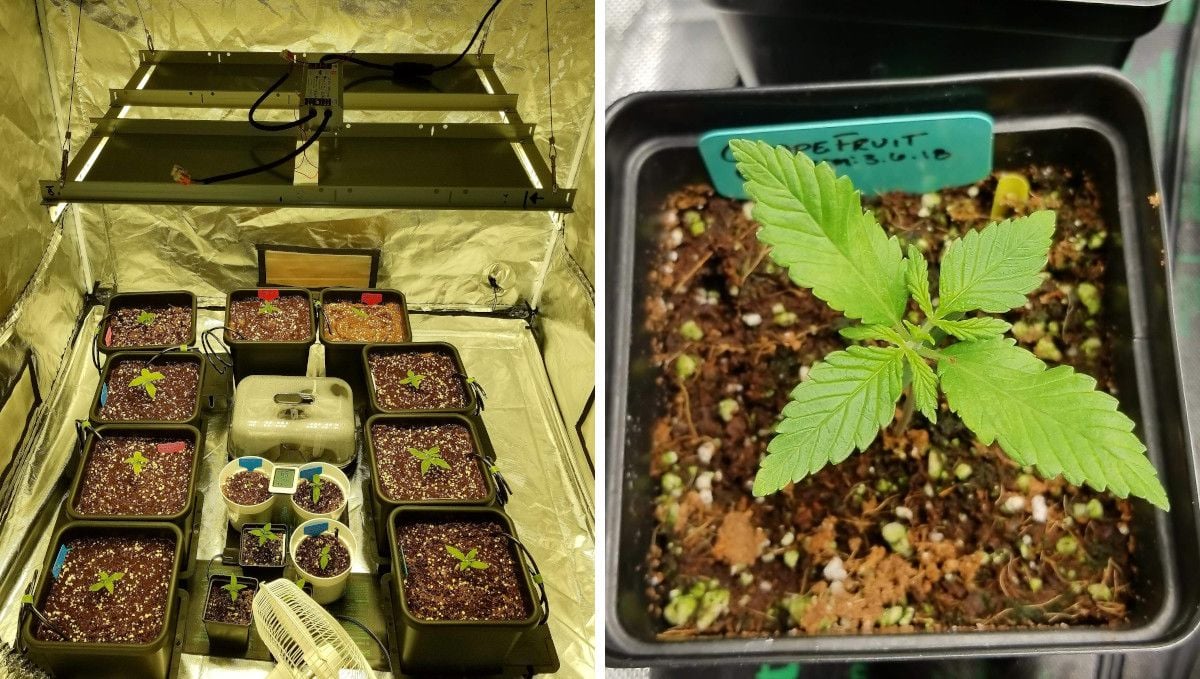
When judging whether your seedling is doing well or not, the size isn't the only important sign. Also, make note of how the leaves look – they should be healthy green and perky and not arched. It means that you're giving her just the perfect amount of water and food.
5. Mid Veg | Weeks 3-5
For the last two weeks of the vegetative phase, or the second half of the first month from seed, the growth of autoflowers picks up the pace as they develop new pairs of leaves and new side branches every day before transitioning to flowering. At this point in the timeline, plants aren't as vulnerable as before which means that you can lower the RH from 75% to 55-60% (ideally). As for the temperature, keep it around the same 77°F (25°C), with night temps by 5-10 degrees lower.
| Plant Height: | 15-33 cm | Humidity: | 55% |
|---|---|---|---|
| Distance to Light: | 61 cm | Water per Day: | 0.3 gal (1.14 l) |
| Day Temp: | 26°C | pH: | 5.8 |
| Night Temp: | 20°C | TDS: | 900-1080 ppm |
At this time, autos don't look like they need (or will ever need) training, but experienced and forward-thinking gardeners start to train them anyway. The reason is that the bulk of canopy management happens in veg and in autoflowers veg is very short. In fact, it can be over any day now. So, if you were planning to train them, start it early. That's what this grower did, topping his Grapefruit Auto in week 4.
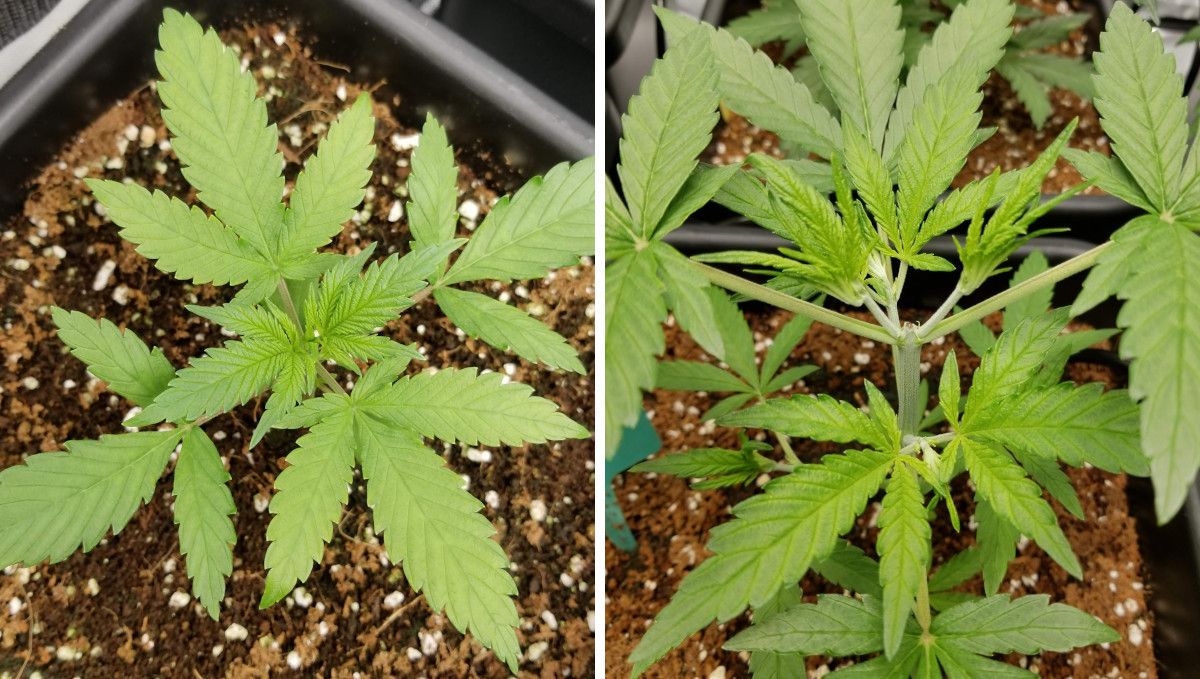
Generally, we'd advise against topping or fimming autoflowers as this can lead to stress and stunted growth. However, in this case, this high-stress method worked fine, and Grapefruit Auto took it in stride. Training is meant to drastically change the internal chemistry of the plant. Now that there's no apex that stands taller than the rest, the plant diverts everything from the main stem to the side branches, and they begin to grow much more rapidly, resulting in a much bushier plant.
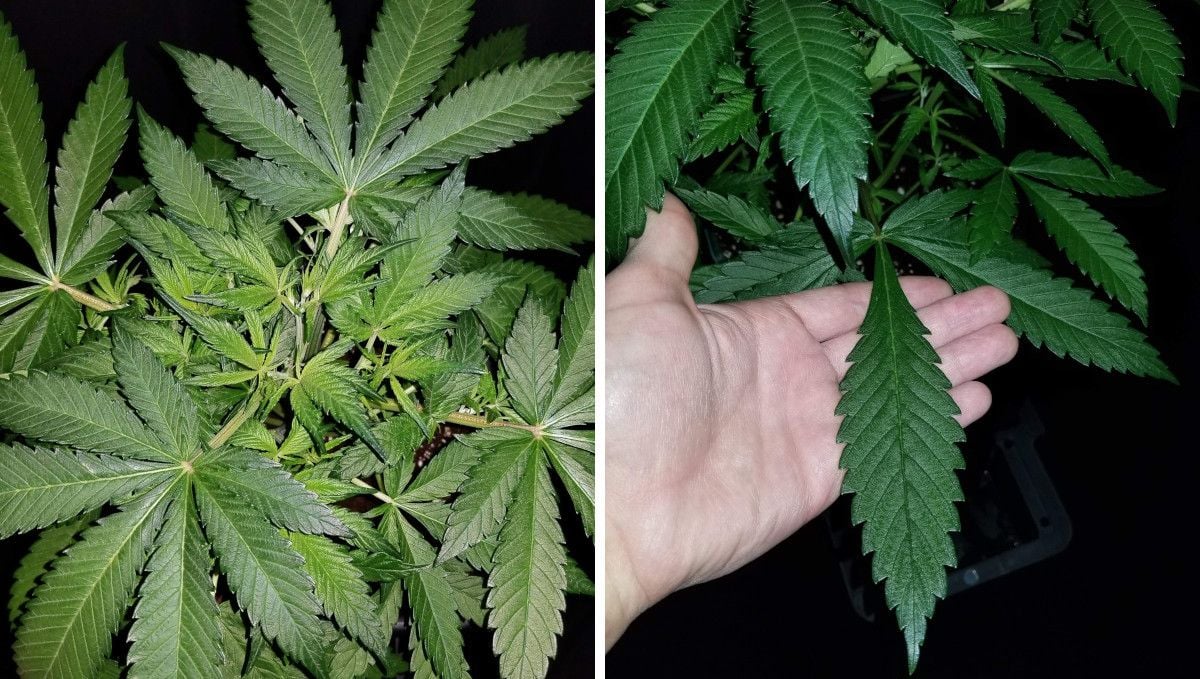
In the pic above, you can clearly see how well-fed Grapefruit Auto looks. She has large fan leaves with a saturated green color but no signs of overfeeding.
6. Transition (Pre-Flower) | Week 6
Some time at the end of the first month or the start of the second, autoflowers show sex and, shortly after, start to flower. Hopefully, the flowers will be female – it's easy to recognize them by a pair of tiny white hairs growing from their body. To see the first of these hairs, one needs to look very closely and probably deep inside the canopy, in the middle nodes. Later, the hairs will be more conspicuous as they'll start to form on tops too.
| Plant Height: | 53 cm | Humidity: | 55% |
|---|---|---|---|
| Distance to Light: | 61 cm | Water per Day: | 0.3 gal (1.14 l) |
| Day Temp: | 26°C | pH: | 5.8 |
| Night Temp: | 20°C | TDS: | 1080 ppm |
The rapid growth still continues around this time, with new leaves and branches appearing almost overnight and the existing branches elongating. The color of the tops changes to light green or even yellowish, the new leaves here appear very thin, and before you know it, the tops will get fluffy with hairs and look like future buds.
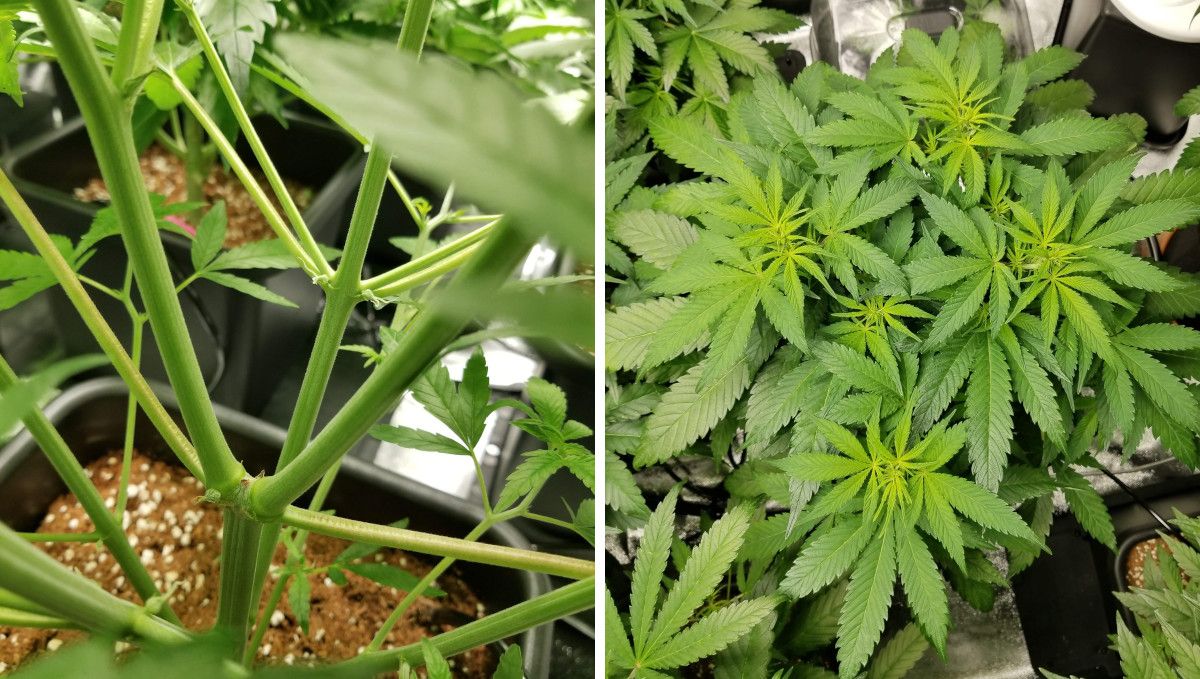
When the flowering starts, the needs of the plant for nutrients changes. Before, the most important nutrient was nitrogen (N). Now, it's phosphorus and potassium (P and K). So, your first order of business is to swap your nutrient bottles, taking one with the higher PK figures in the NPK specs on the label. In this Grapefruit Auto run, the grower used one staple formula – CANNA Coco A & B – throughout the grow but complemented it with different bloom boosters.
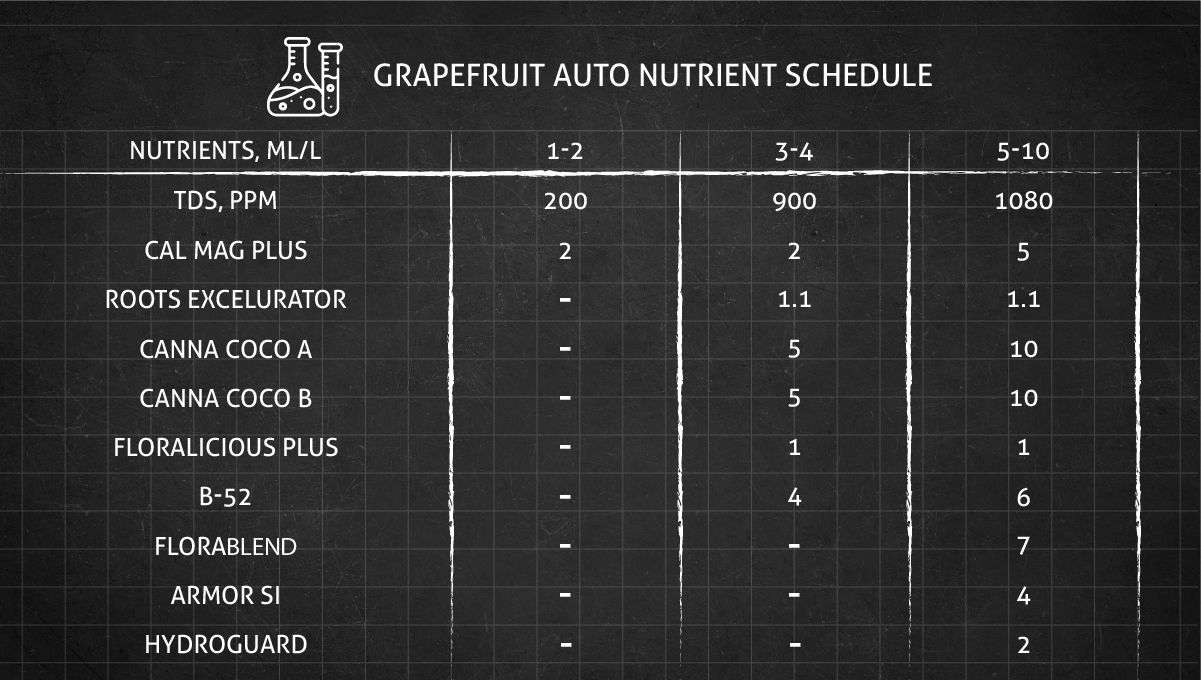
7. Early Flower | Weeks 7-8
In the early stages of flowering, your main job is to keep the right distance from the light to the plant tops as they stretch. Of course, the plants are mature now and can handle extra levels of light. However, there is such a thing as the optimal distance at which the buds mature the fastest without getting burned.
| Plant Height: | 74-86 cm | Humidity: | 50% |
|---|---|---|---|
| Distance to Light: | 61 cm | Water per Day: | 0.3 gal (1.14 l) |
| Day Temp: | 28°C | pH: | 5.8 |
| Night Temp: | 20°C | TDS: | 1080 ppm |
Immature cannabis flowers look white and fluffy. And very insubstantial at first. You may even wonder whether these tiny things will ever expand to form huge and dense colas that obscure the branches with their flower mass. However, they will, just give them time. Many plants at this stage have no 'crystals' on calyces and little leaves, but the most resinous of them, such as Grapefruit Auto, get covered by trichomes this early.
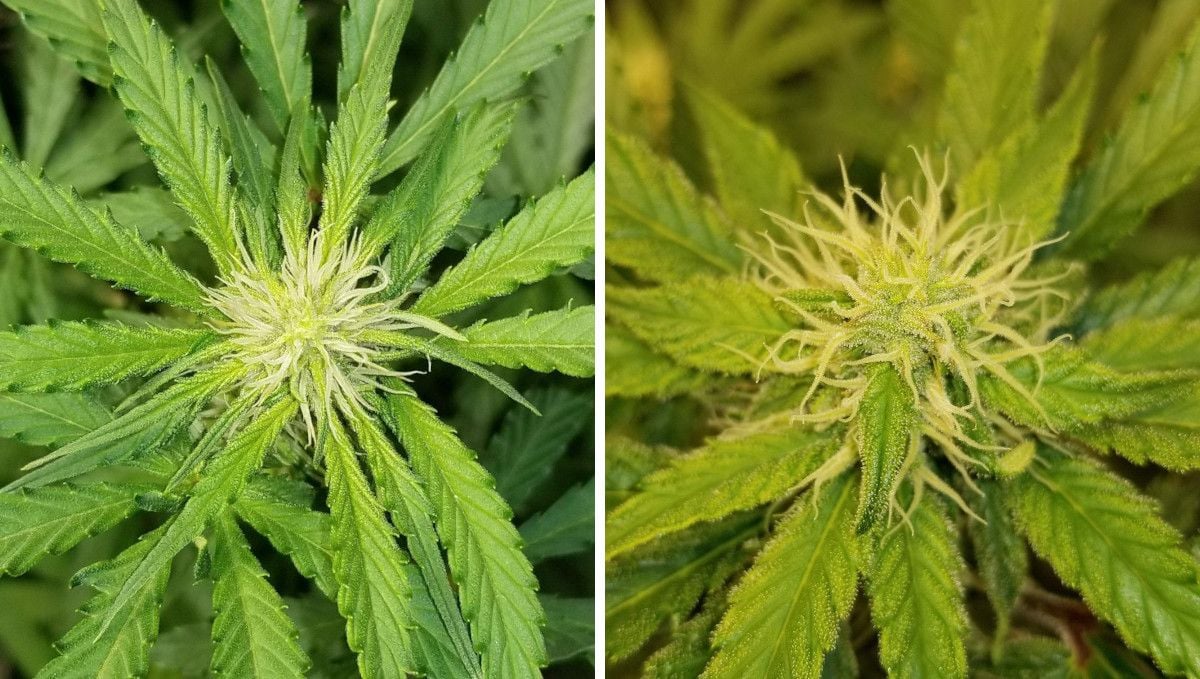
Please note that at this stage, your autoflower starts getting hungry, so you'll either introduce new products suitable for flowering or up the levels of those you've been using before. Just watch closely for the signs of overfeeding as different strains react differently to high doses of nutrients. We suggest experimenting over several grows, starting low and slow at first to get a feel of how much food marijuana plants can handle.
This particular Grapefruit Auto had a good appetite as it was kind of big for an autoflower. The best way to get an idea of its size throughout the cycle is by looking at the height chart below:
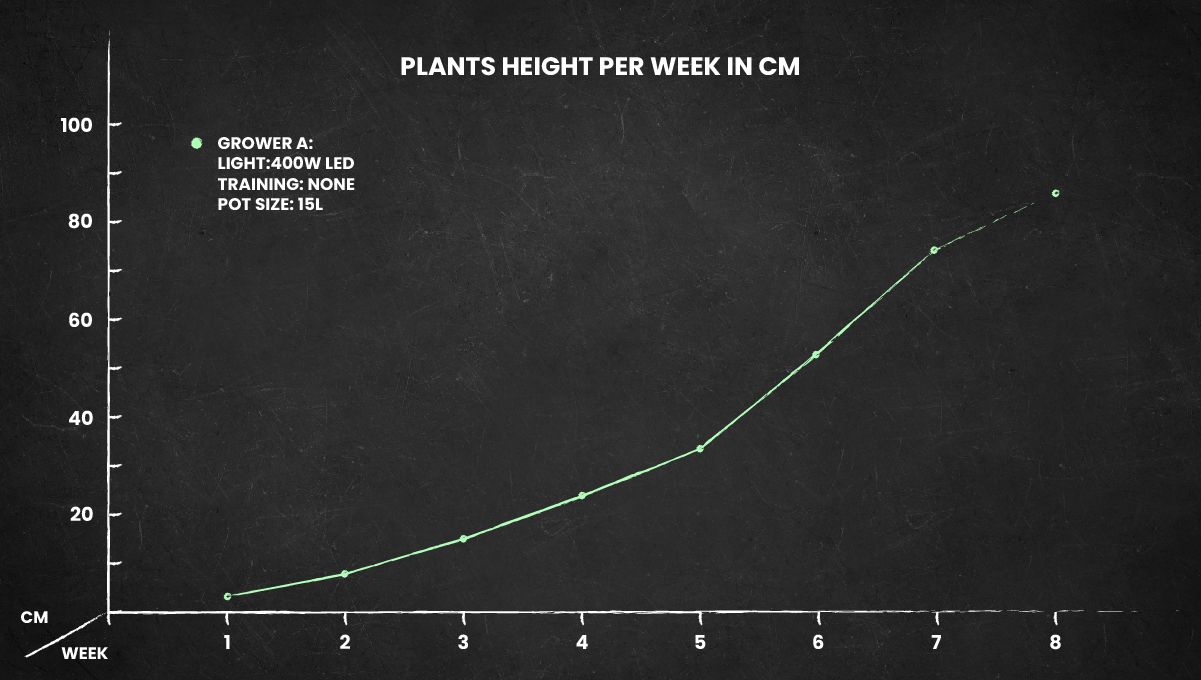
8. Mid Flower (Bulk Phase) | Weeks 9-10
When the flowering plants stop stretching, they begin to fill out as flower clusters little by little cover all internodal distances and form continuous long colas. Fat buds like this are a pleasure to look at, but they also mean trouble as mold and bud rot are an ever-present risk, so keep the relative humidity at around 35-40% if you can.
| Plant Height: | 86 cm | Humidity: | 50% |
|---|---|---|---|
| Distance to Light: | 61 cm | Water per Day: | 0.3 gal (1.14 l) |
| Day Temp: | 28°C | pH: | 5.8 |
| Night Temp: | 20°C | TDS: | 1080 ppm |
If you've managed to keep your autoflower compact and bushy, the buds will probably be uniform across all branches (like in the pic below). However, make sure that your light has enough penetration to reach deep down into the canopy. If not, you have two ways to remedy the situation: defoliate those fan leaves that shade promising bud sites and lollipop (i.e. completely remove) those that are too far down to amount to anything.
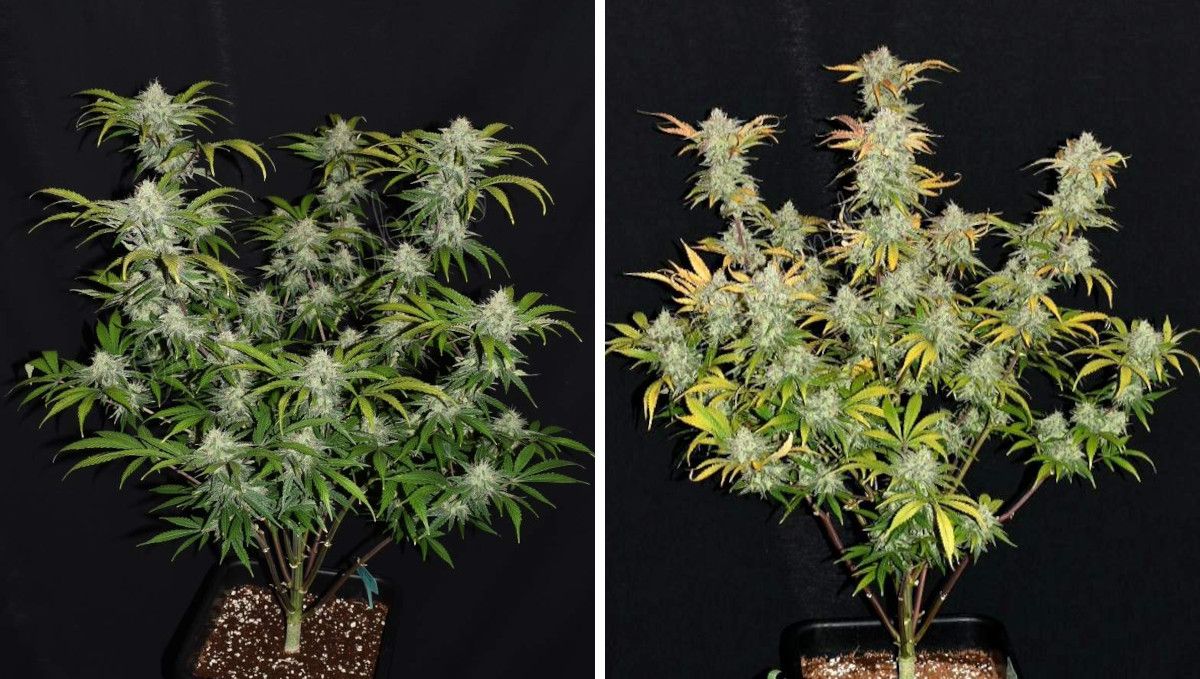
Another thing that is almost just as important indoors as light penetration is the unrestricted airflow as plants need both light and CO2 for photosynthesis. Moreover, good air movement prevents issues with fungal infections and pests. Facilitate airflow with oscillating fans strategically placed in such a way that the air circulates even below the canopy.
9. Ripening And Harvest | Week 11
The stretching of Grapefruit Auto had stopped a couple of weeks before, but the buds themselves continued to grow. They not only gained in size but also got denser and heavier. However, at some point, this stops too, and there'll come a day when you won't notice any changes anymore and start wondering if it means that you should just harvest your buds. However, don't be in a hurry and watch for more sure signs of the approaching harvest.
| Plant Height: | 86 cm | Humidity: | 40% |
|---|---|---|---|
| Distance to Light: | 61 cm | Water per Day: | 0.3 gal (1.14 l) |
| Day Temp: | 28°C | pH: | 5.8 |
| Night Temp: | 20°C | Smell: | Strong |
When trying to determine if the buds are mature enough, you can use the breeder's specs as a reference. However, it's a very inaccurate method as strains have phenotypes with slightly varying flowering times and growing conditions affect this as well. You can also look at the pistils (white hairs) and see if they're still white or have begun to dry out and turn brown. Again, this symptom isn't very accurate either.
The only way to catch the moment when the buds are at their peak is to inspect them through a hand microscope. When seen under a 60x microscope, the trichomes that cover calyces and little leaves can appear either clear, cloudy, or amber. Your perfect window is when all clear ones have turned cloudy and maybe there're a few ambers too.
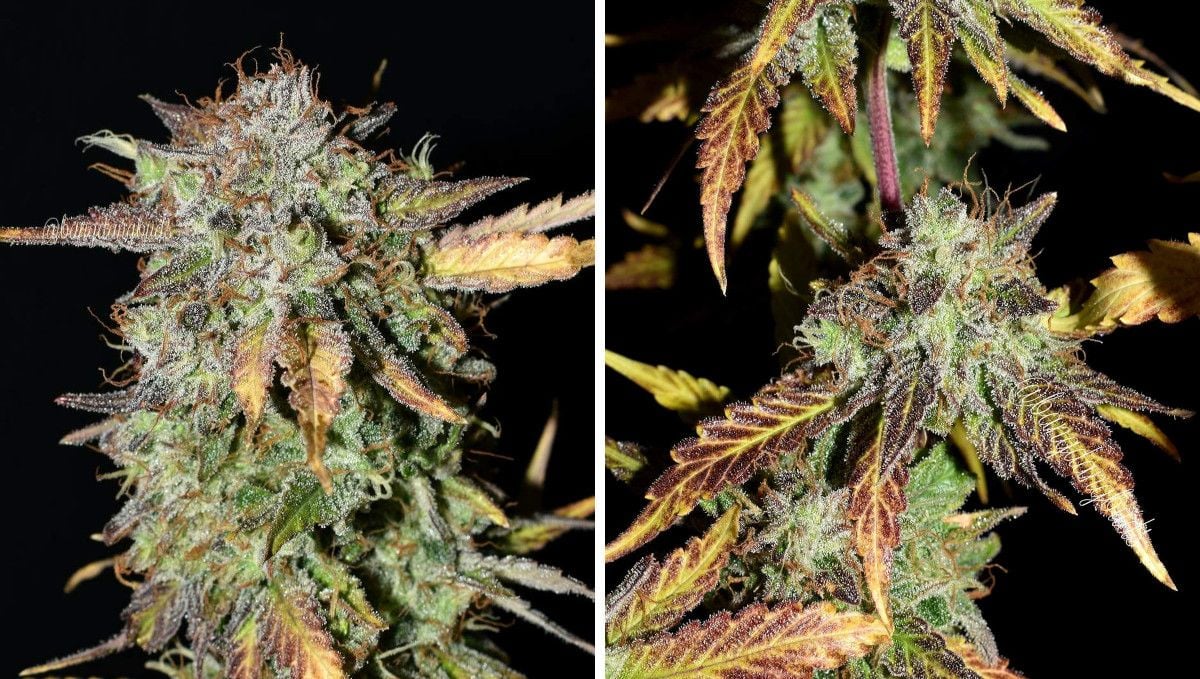
Looking at the photos above and below, you can see another symptom of the impending harvest – the leaves start to fade and display lots of interesting autumn colors. Sometimes the fade looks beautiful, other times messy, but it's always a good thing as it means that green chlorophyll inside buds and leaves begins to degrade so it won't give the future smoke the characteristic unpleasant taste of hay.
While watching trichs for signs of maturity, think not just of the peak potency but of the character of the high. When trichomes are still clear, you get a more clear-headed and energizing high from the smoke (but also rather weak and short-lived). When trichomes begin to turn amber, the high becomes more and more sedating. So, choose the right moment depending on the kind of effects that you prefer.
10. Yield and Smoke Report
The whole life cycle of this Strawberry Gorilla Auto took just 11 weeks, and when the buds had faded to a beautiful subdued color with low-key greens and chocolate hues under a thick layer of frost, the grower harvested them and got an amazing harvest of 135 g (4.76 oz) dry from just one plant out of many growing under a 400W LED.
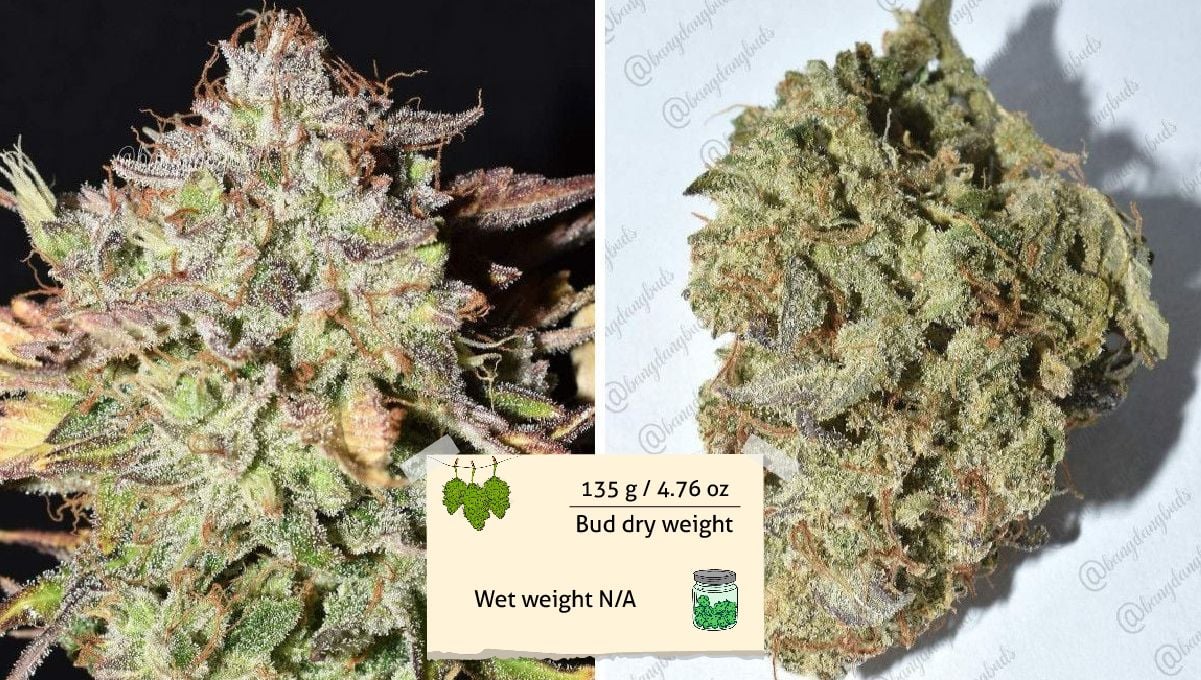
The character of the high was dominated neither by Indica nor Sativa but seemed like a perfect split between the two. The grower characterized the flavor profile of Grapefruit Auto as unique.
The buds absolutely reeked of a sweet grapefruit at the end of flower and after the cure it's very citrusy and you can smell it across the room when you pop the jar open. The smoke is so smooth and the ash is pure white. The high last a couple hours hitting hard at first then fades slowly. For me it's a creative euphoric buzz that relaxes but wont hold you back. I been smokin this all day and love it.
Hawkbo
11. In Conclusion
You should definitely try this strain if you like a smoke that smells and tastes good while the high, which is very balanced and unlike most others, comes as a close second. Grapefruit Auto is also a pleasure to grow: she tolerates high doses of nutrients and can perform great even under weak lights. You're sure to like this one both in your grow tent and in your bowl.









Comments